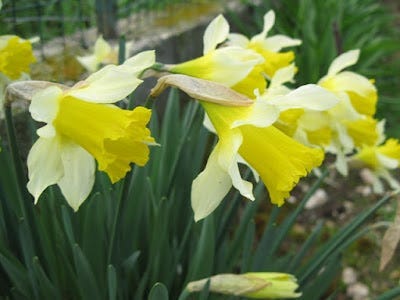Asphodels and Narcissi: Homer, William and Dorothy Wordsworth
Dead Achilles striding through the daffodils of the underworld
In the Odyssey book 11, Odysseus sails to the edge of the world to consult with the dead. He does this by digging a hole in the earth, a cubit each way, then making drink-offerings of honey and milk, then of wine, and then of water, over which he sprinkles ‘white barley meal’ and then uttering a prayer to the departed. Finally, he tells us, ‘when I had prayed sufficiently to the dead, I cut the throats of two sheep and let the blood run into the trench’. At this the ghosts come crowding up from Erebus, but only by drinking the blood of the sacrificed sheep can they speak: Odysseus keeps the bulk of them away with his sword, because he specifically wants to speak to dead Tiresias, who has the information he needs to enable him to get safely home.
What is the Erebus, the land of the dead, like? It is dark: the Greek ἔρεβος means ‘darkness, gloom’. Tiresias describes it as ἀτερπής χῶρος, ‘a joyless land’, ‘a land without delight’ [Odyssey 11:94] filled with τε νεκροὶ ἀφραδής the silly, insensate dead (ἀφραδής is the opposite of φραδής, phradḗs, which means ‘wise, understanding, shrewd’). Odysseus speaks with various other ghosts, including his former comrade Achilles, whom he praises: ‘Achilles, no man before was ever as blessed as you, nor shall any ever be again. For of old, when you were alive, we Argives honoured you as if you were a god, and now that you are here, you rule mightily among the dead. So, Achilles, do not grieve at being dead.’ But Achilles isn’t having any of that:
No, do not speak soothingly to me of death, glorious Odysseus. I should choose, if only I might be alive again on earth, to be the slave of the meanest man, landless and poor, rather than be lord over all the dead that have perished.
Achilles wants to hear about his son, Neoptolemus; and when Odysseus assures him that he is a brave, comely, honoured warrior in the lands of the living, Achilles strides off in delight:
ὣς ἐφάμην, ψυχὴ δὲ ποδώκεος Αἰακίδαο φοίτα μακρὰ βιβᾶσα κατ᾽ ἀσφοδελὸν λειμῶνα, γηθοσύνη ὅ οἱ υἱὸν ἔφην ἀριδείκετον εἶναι. [Odyssey, 11:539-41]So I spoke, and the spirit of Aeacus’s son departed with long strides over the meadow of asphodel, joyful that I had said his son was preeminent in life.
‘Spirit’, here, is ψῡχή (psūkhḗ)—that is, psyche—and the landscape over which he walks is ἀσφοδελὸς λειμών (asphodelòs leimṓn). But here’s one strange thing. The asphodels could be Asphodelus albus, the ‘white asphodel’, a plant native to the Mediterranean, commonly found in heathland and drier soils of central Spain, southern France, the Balkans and on the African continent, mainly in Libya. It is a pale, rather spiky plant, and suitable for, or at least not entirely incompatible with, what we might assume to be the dry soil of Erebus (how it grows in perpetual darkness is another matter). The asphodel was sacred to Persephone, which is another reason why Homer talks of them growing in the underworld. But λειμών means ‘any moist, grassy place meadow’: the watery root of the word shared by λιμήν ‘harbour’ and λίμνη ‘lake’. This doesn’t sound like the parched, barren landscape some suggest characterises the underworld. Perhaps Erebos is wetlands rather than desert. In the Iliad, on several occasions warriors are killed on the battlefield and despatched to ‘Hades κλυτόπωλος’, ‘Hades of the noble horses’, ‘the underworld of fine steeds’. That doesn’t sound like a desert. The god of the underworld, Hades himself, keeps hounds, rides his fine steeds to hunt, is married to the beautiful Persephone, and is called ‘strong doorkeeper’.
Suzanne Amiguis says that ‘some modern scholars, basing themselves on the commentaries of Herodian and Eustathius on the Homeric formula κατ᾽ ἀσφοδελὸν λειμῶνα, “across the Asphodel Meadow,” have preferred κατὰ σποδελὸν λειμῶνα, “across the Plain of Ashes.”’ But λειμών makes even less sense in this formulation: it’s not a word that means plain or desert, it means well-watered, even waterlogged terrain. A water-meadow of ashes would be, what: just mud.
Here's an alternative: daffodils. What we think of as daffodils today, the spiky yellow plants, is a different species to what we call asphodel; but the two are related, and the word daffodil is a doublet of asphodel: it comes from Middle English affodill (“ramson”), via Medieval Latin affodillus, itself from Latin asphodelus, the equivalent of the Ancient Greek ἀσφόδελος. According to the etymologists ‘the initial d- comes from the merging of the article in Dutch de affodil, the Netherlands being a source for bulbs’. This happens a lot in English, a process called ‘rebracketing’, by which we get the modern words adder (originally ‘a naddere’, it became ‘an addere’), apron (originally this was napron, from the same root as napkin: but ‘a napron’ became ‘an apron’) and other words—including newt, nickname, orange and umpire.
The thing about daffodils, or narcissi more broadly, is that they like well-watered soil: they grow best in marshes, pastures, woodland, river banks ‘and the pseudonarcissi actively prefers humid situations such as stream margins, springs, wet pastures, clearings of forests or shrublands with humid soils and moist hillsides.’ This sounds more like the kind of plant that would grow in a λειμών.
Is that the scene being described? Achilles striding off into the underworld through a meadow of daffodils? Is the afterlife well-watered? Nothing in Odyssey 11 specifies dryness or aridity, except by implication; and the opening, in which Odysseus pours four different fluids—milk, wine, water and blood—opens the way wetly.
Keep reading with a 7-day free trial
Subscribe to Substack-ships On Fire, Off The Shoulder Of Orion to keep reading this post and get 7 days of free access to the full post archives.


